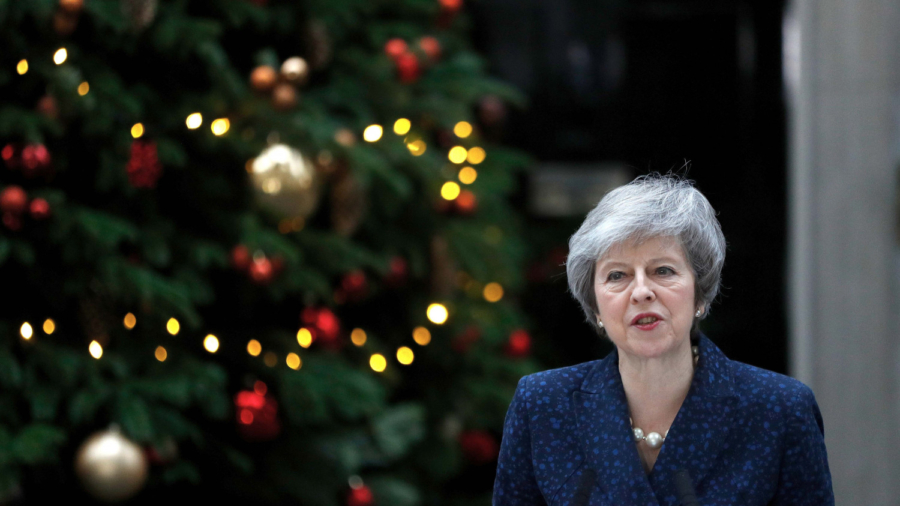LONDON—Prime Minister Theresa May vowed to fight for her job on Dec. 12 after Conservative lawmakers triggered a challenge to her leadership, saying a change could jeopardize Britain’s planned divorce from the European Union.
With less than four months until the United Kingdom is due to exit on March 29, Brexit has been plunged into chaos with options ranging from a potentially disorderly no-deal departure to another referendum that could reverse it.
Speaking outside her Downing Street residence hours before the vote on her leadership, May said she would battle for her premiership with everything she had.
In a stark warning to Brexit-supporting opponents who instigated the challenge, May said if they toppled her then the EU exit would have to be delayed and perhaps even stopped.
“A new leader wouldn’t be in place by the Jan. 21 legal deadline, so a leadership election risks handing control of the Brexit negotiations to opposition MPs in parliament,” said May.
“A new leader wouldn’t have time to renegotiate a withdrawal agreement and get the legislation through parliament by March 29. So one of their first acts would have to be extending or rescinding Article 50, delaying or even stopping Brexit when people want us to get on with it,” she said.
A secret ballot will be held between 6 and 8 p.m. on Dec. 12 in a room at the House of Commons, and an announcement made as soon as possible afterwards.

According to the rules, May could be toppled if 158 of her 315 lawmakers vote against her, though a significant rebellion could also end her career. At least 75 Conservative lawmakers had expressed public support for her in the morning of Dec. 12.
Brexit is Britain’s most significant political and economic decision since World War Two though pro-Europeans fear it will divide the West as it grapples with growing assertiveness from Russia and China.
The outcome will shape Britain’s $2.8 trillion economy, have far reaching consequences for the unity of the United Kingdom, and determine whether London can keep its place as one of the top two global financial centers.
The British pound, which has lost 25 cents against the U.S. dollar since the 2016 referendum, fell on the confidence vote but then rose to 1.2528 on news Brexit might have to be delayed.
‘She Must Go’
May, a vicar’s daughter who voted to remain in the EU, won the top job in the turmoil that followed the 2016 EU referendum but promised to implement Brexit, while keeping close ties to the bloc, as a way to heal a divided nation.
Widely praised for a punishing work ethic and a dutiful approach to solving the Brexit divide, May’s premiership has been characterized by obduracy in the face of frequent crises.
Ever since formally triggering the Brexit divorce in March 2017, May has tried to find a way to keep Britain closely aligned with the EU after its exit—the essence of the divorce deal struck with Brussels last month.
But on Dec. 10 she abruptly pulled a parliamentary vote on her deal in the face of ridicule from lawmakers. She then rushed to Europe to seek assurances from EU leaders about the deal.

The EU has insisted it will not re-negotiate but some of the bloc’s leaders have suggested Britain could still change its mind on leaving.
Brexit-supporting lawmakers in her party have accused May of betraying the people’s vote in negotiations while opponents say she has negotiated a deal that is the worst of all worlds—out of the EU but with no say over many rules it has to abide by.
Graham Brady, chairman of the Conservative Party’s so-called 1922 committee, said the threshold of 15 percent of the parliamentary party seeking a confidence vote had been exceeded meaning a vote would be held on Dec. 12.
“Theresa May’s plan would bring down the government if carried forward,” lawmakers Jacob Rees-Mogg and Steve Baker said in a statement.
“But our Party will rightly not tolerate it. Conservatives must now answer whether they wish to draw ever closer to an election under Mrs. May’s leadership. In the national interest, she must go.”
Schism in the UK
A schism over Europe in the Conservative Party over Britain’s relationship with the EU contributed to the fall of all three previous Conservative premiers—David Cameron, John Major, and Margaret Thatcher.
Cameron bet all on a referendum he lost in 2016.
Now, May—whose personal standing was weakened when she called a snap election last year which cost her a parliamentary majority—is telling her opponents that if she goes, Brexit will be delayed, or even canceled.
Senior ministers including Chancellor of the Exchequer Philip Hammond, Foreign Secretary Jeremy Hunt, Environment Secretary Michael Gove, and Home Secretary Sajid Javid expressed support for May. They warned that changing leader at such an important moment in British history was folly.
But as investors and company bosses tried to gauge the ultimate outcome of the political crisis, some were betting that Brexit would be thwarted.
The EU’s top court ruled on Dec. 10 that Britain could cancel its official Article 50 notice to leave the bloc without permission from other members and without losing special privileges.
Both May’s ruling Conservatives and the main opposition Labour Party are publicly committed to carrying out Brexit.
A no-deal Brexit, though, is seen as so disruptive to trade and the economy that parliament would be under pressure to block it.
“I am backing the Prime Minister 100 percent,” said Gove, the most senior Brexiteer in May’s government. “She is battling hard for our country and no one is better placed to ensure we deliver on the British people’s decision to leave the EU.”
By Kylie MacLellan and Guy Faulconbridge


